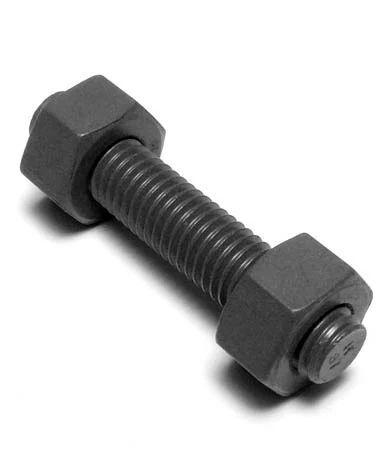When it comes to high-stress environments where intense pressure and heat resistance are essential, B7 2H stud bolts offer unmatched strength and durability. These bolts are the backbone of secure connections across industries like oil & gas, petrochemicals, and heavy machinery. In this guide, we’ll explore what makes the B7 2H stud bolt a go-to choice, its unique characteristics, applications, and best practices for installation.
What is a B7 2H Stud Bolt?
B7 2H stud bolts are specialized fasteners designed for applications where a high-strength connection is necessary. Unlike regular bolts, B7 2H stud bolts are threaded at both ends, making them perfect for flanged connections or joining equipment where a robust and secure hold is critical. Made of chromium-molybdenum steel, B7 2H bolts are durable and withstand extreme environments, with the added strength of heavy hex nuts marked “2H” to maximize stability and load capacity.
What Makes B7 2H Stud Bolts Unique?
The strength of B7 2H stud bolts lies in their material composition and design. Here’s what sets them apart:
- High-Tensile B7 Grade Steel: Made from AISI 4140/4142 chromium-molybdenum steel, B7 bolts are heat-treated to withstand high stress and temperature conditions. They offer tensile strength of about 125,000 psi, making them ideal for heavy-duty industrial applications.
- 2H Heavy Hex Nuts: The heavy hex nuts used with B7 bolts are hardened carbon steel, marked “2H” to signify their high load-bearing capacity and robustness. Together, the bolt and nut provide stability in demanding conditions.
- Temperature and Pressure Resistance: B7 bolts excel in environments with elevated temperatures, functioning effectively at temperatures up to 450°C (840°F). This resistance to thermal expansion ensures they maintain their structural integrity under continuous stress.
Key Features of B7 2H Stud Bolts
To understand why B7 2H stud bolts are so valuable, it’s important to look at the defining features that make them the best choice for heavy-duty applications.
- High Tensile Strength: B7 bolts are designed to handle extreme loads, with tensile strengths capable of withstanding significant stress without deforming.
- Temperature Tolerance: These bolts maintain their strength at high temperatures, perfect for industrial applications with intense heat exposure.
- Corrosion Resistance: While B7 bolts themselves are not inherently corrosion-resistant, applying zinc or galvanization coating increases their durability in corrosive environments.
- Durability: The combination of B7 grade steel and 2H nuts creates a long-lasting, wear-resistant fastener that operates reliably even under harsh environmental factors.
Applications of B7 2H Stud Bolts
B7 2H stud bolts find a home in a wide range of industrial sectors where performance under pressure is non-negotiable. Here’s where they make the biggest impact:
- Oil & Gas Industry: These bolts are vital in the oil and gas industry, connecting valves, pressure vessels, and flanges in high-pressure systems. Their ability to withstand intense environments ensures a secure connection in crucial systems.
- Petrochemical and Chemical Processing: B7 2H stud bolts connect pipelines, reactors, and heat-exposed equipment in chemical processing plants. They offer high-temperature resistance necessary to ensure the integrity of piping systems.
- Power Generation: Used in heat exchangers, boilers, and other high-temperature equipment in power plants, B7 2H bolts resist thermal expansion, making them a reliable option in these energy-intensive settings.
- Manufacturing and Heavy Machinery: The B7 2H bolts secure heavy machinery and equipment that experience constant vibration, load shifts, and wear, providing the durability needed for long-term performance.
Installation Tips for B7 2H Stud Bolts
Proper installation of B7 2H stud bolts is crucial for safety and performance. Here are best practices to ensure they perform optimally:
- Torque Specifications: Adhering to torque specifications is essential to avoid over-tightening or damaging the bolt. Using a calibrated torque wrench helps achieve a secure fit without compromising the bolt’s strength.
- Lubrication: Apply lubrication on the threads to reduce friction during installation, preventing galling (a form of wear caused by adhesion) and ensuring smoother application.
- Routine Inspection: Regularly check for signs of wear, corrosion, or loosening to maintain the integrity of the assembly. These checks help catch potential issues early, avoiding operational disruptions or safety hazards.
How to Choose the Right B7 2H Stud Bolt for Your Application
Choosing the appropriate B7 2H stud bolt means understanding the environment and conditions of your application. Consider the following factors:
- Environment: Assess temperature, pressure, and potential chemical exposure to select the appropriate coatings and materials that will withstand specific conditions.
- Size and Length: Ensure that the bolt length, diameter, and thread pitch align with engineering specifications for a perfect fit.
- Standards Compliance: Verify that B7 bolts meet ASTM A193 standards, while the 2H nuts comply with ASTM A194 requirements. Meeting these standards guarantees the bolts can withstand industrial conditions.
Benefits of B7 2H Stud Bolts
The advantages of B7 2H bolts make them indispensable in high-stakes industries:
- Reliability: With a stable and secure fit, B7 2H bolts provide dependable connections, even in challenging environments.
- Strength: Their high tensile strength ensures they handle heavy loads with ease, delivering reliability in crucial applications.
- Temperature Endurance: The heat resistance of B7 2H bolts allows them to maintain their strength and stability under high-temperature conditions.
Potential Drawbacks of B7 2H Stud Bolts
Although B7 2H bolts excel in many applications, they do have some limitations:
- Corrosion Susceptibility: Without protective coatings, B7 2H bolts may not hold up well in highly corrosive environments.
- Higher Cost and Maintenance: Compared to standard bolts, B7 2H bolts tend to be more costly and may require routine inspection and maintenance to ensure they perform optimally.
Conclusion
B7 2H stud bolts stand out as a superior choice for high-stress, high-temperature industrial applications. Their robust B7 steel construction paired with heavy hex 2H nuts provides unmatched stability and strength, making them ideal for oil & gas, petrochemical, and power generation industries. By understanding the key features, applications, and proper installation of B7 2H stud bolts, you’ll ensure optimal performance and safety across demanding environments. With these bolts, you secure a reliable solution that keeps operations running smoothly and safely in even the toughest conditions.
















